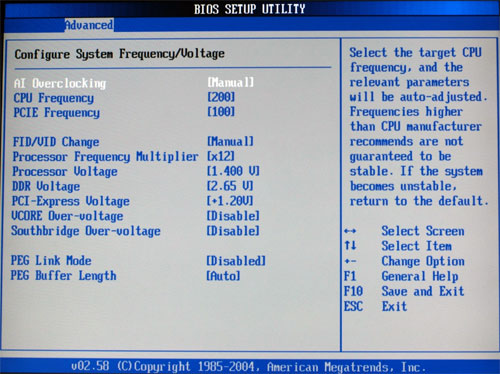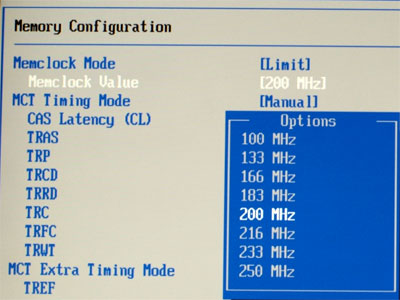Asus A8R-MVP: Mainstream Rocket
by Wesley Fink on November 23, 2005 1:15 AM EST- Posted in
- Motherboards
Basic Features: Asus A8R-MVP
While the BIOS adjustments are not as extensive as the Asus A8N32-SLI Deluxe or the DFI RDX200, most of the adjustments needed for overclocking control are definitely here.
| Asus A8R-MVP | |
| CPU Interface | Socket 939 Athlon 64 |
| Chipset | ATI RD480 Northbridge - ULi M1575 Southbridge |
| Bus Speeds | 200 to 400MHz in 1MHz Increments |
| Memory Speeds | DDR200, 266, 333, 400 (433, 466, 500 with Rev. E AMD) |
| PCIe Speeds | 100 to 150MHz in 1MHz Increments |
| PCI/AGP | Fixed at 33/66 |
| Core Voltage | Auto, 0.8V to 1.45V in 0.025V increments PLUS 0.2V with vCore Over-voltage (Maximum vCore 1.65V) |
| CPU Clock Multiplier | 4X-25.5X in 0.5X increments |
| DRAM Voltage | Auto, 2.65V to 3.2V in .05V to .1V increments |
| HyperTransport Frequency | 1000MHz (1GHz) |
| HyperTransport Multiplier | Auto, 1X to 5X |
| PCI Express Voltage | 1.2V, 1.3V, 1.4V, 1.5V |
| Southbridge Overvoltage | Enabled (+0.1v) |
| PEG Link Mode | Auto, Disabled, Normal, Fast, Faster |
| PEG Bugger Length | Auto, Short, Long, Longer, Longest |
| AI Overclocking | Manual, Auto*, Standard*, Overclock Profile *Set CPU Frequency and Other Parameters Automatically |
| Overclock Profile Options | 3%, 5%, 10%, 15%, 20%, 30% |
| Memory Slots | Four 184-pin DDR DIMM Slots Dual-Channel Configuration Regular Unbuffered or ECC Memory to 4GB Total |
| Expansion Slots | 2 PCIe x16 1 PCIe x1 3 PCI Slots 1 Asus MVP Switch Card in Secondary (Black) PCIe Slot |
| Onboard SATA/RAID | 4 SATA2 Drives by ULi M1575 (RAID 0, 1, 1+0, 5, JBOD) |
| Onboard IDE/IDE RAID | Two Standard ATA133/100/66 (4 drives) |
| Onboard USB 2.0/IEEE-1394 | 8 USB 2.0 ports supported by ULi M1575 2 1394 Firewire by TI 1394 |
| Onboard LAN | 1 Gigabit Ethernet PCI Ethernet by Marvel Yukon 88E8001 |
| Onboard Audio | Azalia HD Audio by ADI AD1986A Soundmax codec |
| BIOS Revision | AMI 0037 (11/17/05) Beta |
While the BIOS adjustments are not as extensive as the Asus A8N32-SLI Deluxe or the DFI RDX200, most of the adjustments needed for overclocking control are definitely here.













74 Comments
View All Comments
EnlightenedOne - Thursday, December 8, 2005 - link
Hey Wesley, Great Review!I was wondering a few things with this motherboard and the setup.
First, do you think the clawhammer 4000+ would overclock better than the Diego?
What voltage are you feeding your ram to reach such a high frequency?
Do you suggest using the 246 x 12 or the 325 x 9 set up for games?
Finally, what voltage are you feeding the PCIe slot? Also, why haven't you upped the voltage to your cpu core to maintain stability and go beyond 2 days? :)
Zebo - Thursday, November 24, 2005 - link
Great having spread out memory slots. I found many A64 boards stack the dual channel sticks so close they are actually touching between sticks fi you have heat spreaders on there and they can't cool.Price!! I sure miss top of the line boards in the $100 range (Abit NF7-S Abit IS7 etc)granted this new era has high power requirements and thus a beffier boards but no excuse for these $200+ mobos floating around for enthusiants. nV and Intel must be charging crazy high prices for thier newer chipsets.. Thanks ATI.
Legacy support - My printer won't work with full features on USB alone... needs Parallel cable for full control which my DFI does'nt have.
- overclocking potential as Mr. Fink illustrated.
- full features including Fast disk benches and great on-board audio (FWIW).
- Passive cooled mobo design - How many of you hate those whinny 40mm/60mm fans that come on mobos? When they work that is.
Asus really needs to adopt Black though for thier entire lineup unless it goes in an OEM build.. I mean that yellow traces and green board is so 1990's.:(
Live - Thursday, November 24, 2005 - link
s.I couldn’t agree more. Those small fans are highly unreliable and very noisy. And with today’s heat pipe tech there is no reason to not go passive even on the high end boards. ASUS seems to be leading the pack on this. To bad they cant/won’t go all out in their bios. DFI in particular have them beat in bios all the time.
Sxotty - Wednesday, November 23, 2005 - link
That is really not a very thoughtful way to look at it.
If ASUS was "surprised" by your results that would argue they are atypical not typical. It is not as though they never tested the motherboard to see if it worked. If you ever find an engineer surprised by your results than you should assume that they do not represent what the acerage was expected to be. Perhaps it is a wonderful overclocker, but that is evidence that it is not. Perhaps the engineer that was so "promising" really did an excellent job and the other people you spoke with just did not happen to know the test results.
Wesley Fink - Wednesday, November 23, 2005 - link
I can only report what I actually find, and we can both "suppose" all day long. Time will prove whether these overclocking results are typical or atypical.As i said in a comment above: "Asus does extensive overclocking tests on their top-line boards aimed at that market. They generally know how they will perform in overclocking. They do more modest tests on mainstream boards. It is my opinion it never occured to Asus that the A8R-MVP might be a monster overclocker until I reported my results back to them."
I have worked closely with the Asus Engineering team in Taiwan on several Enthusiast board projects, and since my initial results were shared with them after the second BIOS they have not given me any reason to expect that they are not typical for this board. As I said in the Final Words: "We would feel much more comfortable in our praise of the A8R-MVP if we had an opportunity to prove similar overclocking on another five boards pulled at random from retail shelves."
Zebo - Thursday, November 24, 2005 - link
ATI “Certified Motherboard?"?afrost - Wednesday, November 23, 2005 - link
I can't wait to get my hands on this board.....I have been waiting for a solid passively cooled board like this for a long time.The HD audio is a very nice bonus.
Wesley Fink - Wednesday, November 23, 2005 - link
We did additional tests on the Asus A8N32-SLI Deluxe Dual x16 this morning, running at our standard 1280x1024 with AA and AF turned off, with 81.87 drivers. We have added A8N32-SLI benchmarks to F.E.A.R., SC-CT, Quake 4, Doom 3, Far Cry, and Wolfenstein - Enemy Territory.The added benchmarks do not really change any of our conclusions. As you can see, the Asus A8R-MVP is very competetive with the top-line A8N32-SLI Deluxe.
nvidia4ever - Wednesday, November 23, 2005 - link
Thanks for the updates. It really does look like there is another performance choice now for AMD systems. I still would find it interesting to see how a x1800xt performs on ATIs own chipset.Duplex - Wednesday, November 23, 2005 - link
The only thing me and my friends missed is overclockingresultsfor the memory with tight timings like 1T 2-2-2-5 or 2-2-2-7.
The 1T overclocking performance for Asus and Abit has yet been very poor,
with tigh timings even worse. Abit has added higher vdimm options but it
hasn´t helped much. Has this changed with this Asus-Ati-mb or is dfi nf4
still my only option for pc-builds? 230/240/250/260 (/270) MHz???